A Greater Impact, What Teaching has Taught Me
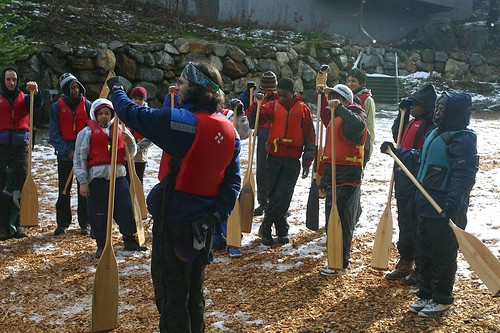
Mountain School has ended for me, but this recent spring session changed my life as an educator. I have become more convinced that I am pursuing the right career and that my teaching techniques have had meaningful impacts in my students’ lives. It is embarrassing for me to speak so candidly and arrogantly, but the parent chaperones have told me I am doing good work. I know this is true because in two successive weeks I choked up at home while journaling. Though I write this article more than two months later, I still feel the emotions welling inside me as I recall specific moments that impacted me earlier in the season.
I blame one student who eloquently spoke about how he feels empowered to change the world. I fault another whose sheer smile in her own accomplishments makes me tear up every time I am reminded of her voice.
International School (grades six to twelve) sent seventh, eighth and ninth graders from Bellevue to spend a whole week with us at Mountain School. Co-teacher Codi Hamblin and I delivered our Carnivore Curriculum, which capitalizes on the scientific method and provides an opportunity for students to experience data collection near campus. We guided students to actively set up an experiment that analyzes possible carnivore habitat.

Mountain School students prepare a transect to study habitat for a carnivore species.
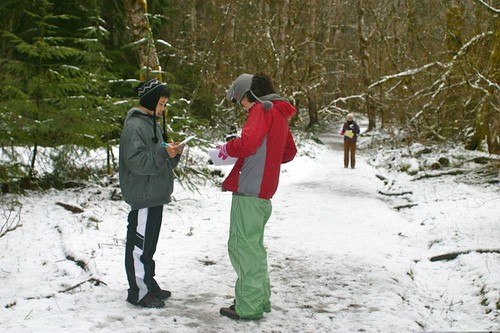 Despite cold, snowy weather, Mountain School students teach each other fun facts about carnivores of the North Cascades.
Despite cold, snowy weather, Mountain School students teach each other fun facts about carnivores of the North Cascades.
As we closed out the week on the last morning, I decided to read Dr. Seuss’ The Lorax to let them unwind and gather their thoughts before heading home. Afterwards, I asked students to place themselves on a spectrum, telling the group if they acted more like the Lorax or the Once-ler. The results astounded me, and the following discussion drove home the teaching point. Most students claimed they felt like the Once-ler, a character driven to succeed in the short-term but not always aware of the effects of his actions in the long-term.
Students recognized their daily actions and began to verbally explore ways to make more responsible decisions, with the mindset of thinking seven generations ahead. They spoke of how every action should be taken with the environment and other people in mind. After an entire week exploring outside, these students committed to bring home mindful and deliberate action always considering others’ needs and those of the environment. I felt the strength of these inspired students, as the power of their ideas and vows resonate through me still.
On the heels of that week-long program came another school from Seattle. South Shore Middle School asked for the same curriculum and I wanted to lead them the same way. But the weather made us miserable as snow and freezing temperatures drove us inside on the first day. They felt content staying inside as much as possible. I knew my approach would have to change from focusing on scientific methodology to simply encouraging them to get out and brave the elements.
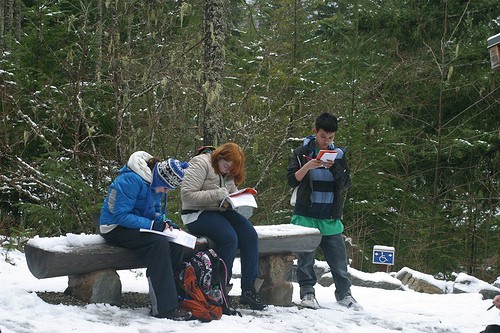 Mountain School students reflect on their experiences at the North Cascades Environmental Learning Center.
Mountain School students reflect on their experiences at the North Cascades Environmental Learning Center.
A student measures the height of a tree using a clinometer.
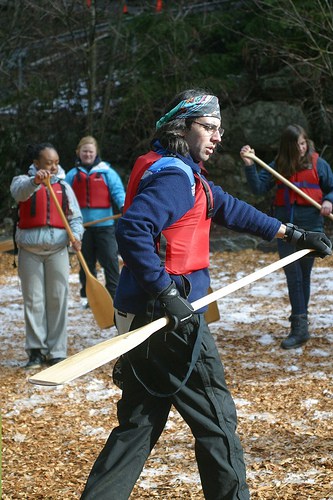
Mountain School Instructor David Strich teaches students paddling techniques before canoeing in Diablo Lake.
Hiking along the Sourdough Creek Trail, I told students there was a waterfall waiting for them at the end. We approached and climbed to the very base of the falls. Everyone was soaked, a light drizzle (slush and snow) drenched us from the skies and from a huge spray coming off the waterfall, thundering into the pool in front of us. We hiked down to a more sheltered area, with every participant helping to make sure we were all safely down.
Sourdough Falls crashes into the rock below. Photo by David Strich.
Upon some high-fives and congratulations, I overheard some students say this was the most incredible thing they had seen. Then little Lucy turned to me with glowing eyes and said, “This is the first time I have ever been to a waterfall. I am so proud of myself.” That smile is engrained in my memory while I try to avoid crying onto my keyboard. In an age when all we hear is how kids are too connected to their electronics, I was able to facilitate one plug herself straight into the heart of the natural world.
Like many teachers, I don’t know if I will ever see these students again. But I can rest assured that for at least a handful of students, I was able to instill a little bit of love for the environment. Hopefully they will remember the experiences and encourage their peers to be stewards alongside them. There is no evaluation I can do about the effectiveness of my teaching, but I have the satisfaction of seeing smiles of success and connection to nature. And I have hope in my students.


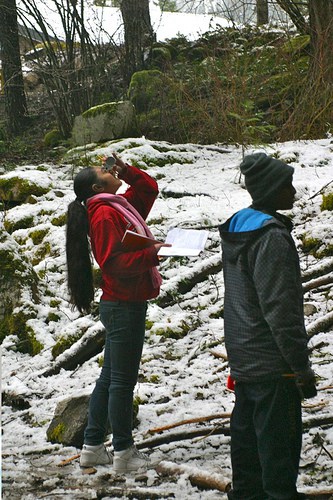
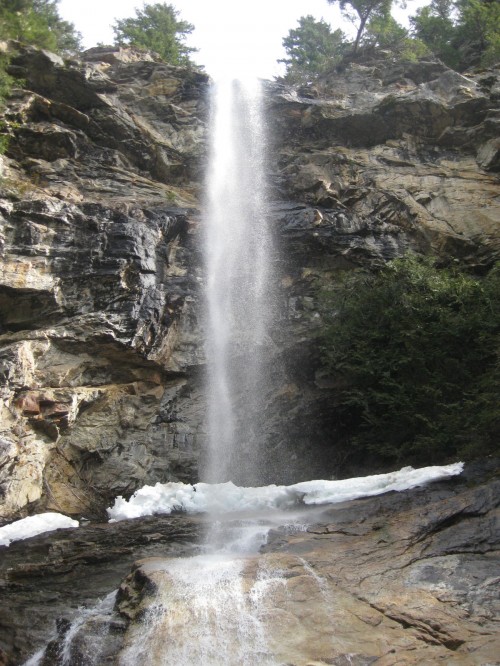
Right on Dave! I have always thought of teaching as planting seeds. Its tough knowing that you will most likely never see your efforts rise to fruition but you can be satisfied that you have made a start. I hope you and all the grads have a rockin summer. peace
Well written Dave, you DO make a difference. Incredible things happen at the ELC because of people with passion, keep that passion forever.
Great article, Dave! I get tears in my eyes thinking about them, too.
What a wonderful read, Dave. Surprisingly, you may see your students again! I am working down in Bellevue now and was mentoring some young students from International School when I came across one of my Mountain School students who had gone up the previous year for the carnivore curriculum… pretty small world we live in in western Washington when it comes to EE!